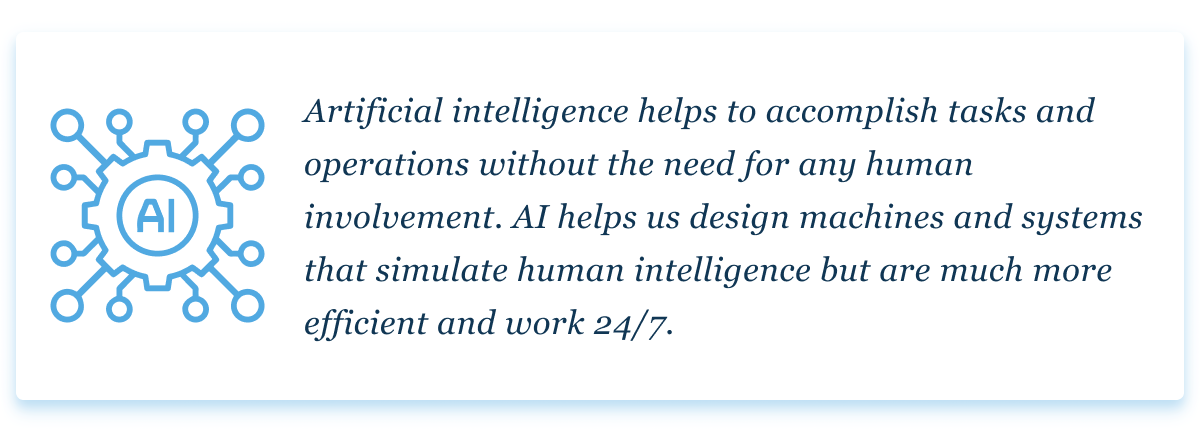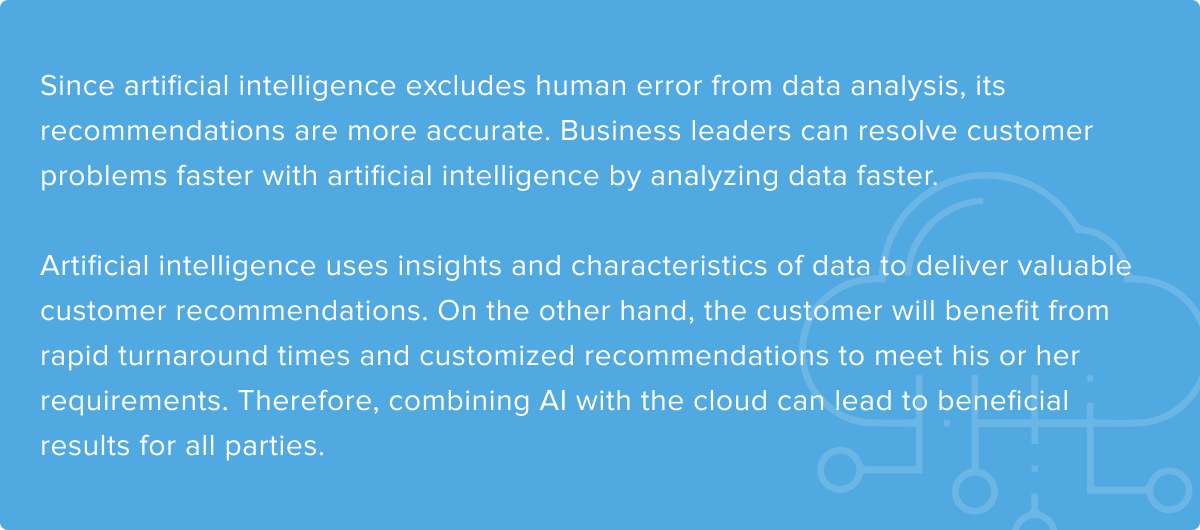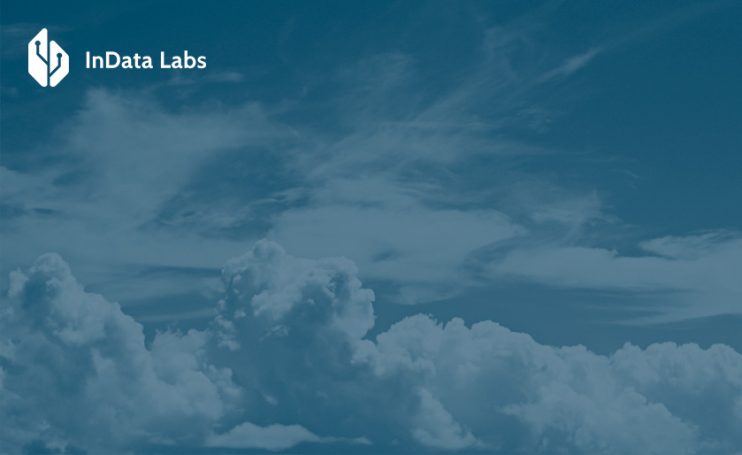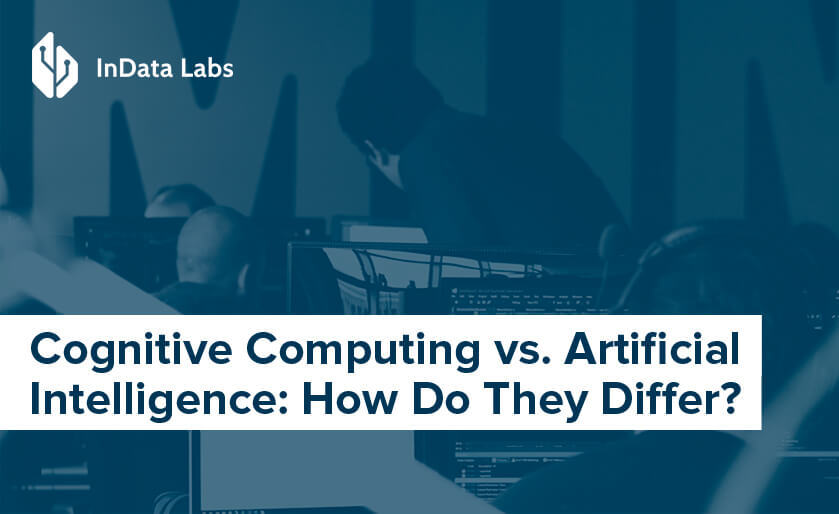Artificial intelligence and cloud computing are two disruptive technologies that are changing how we work. Although they both are distinct from each other and provide many benefits individually, combining them can give us fourfold benefits.
Many organizations have begun integrating AI into their cloud-based infrastructures to develop applications and products that are extremely reliable, efficient, cost-effective, and data-driven.
Many tech giants like Amazon, Apple, and Google have developed Siri, Alexa, and Google Home, which use AI cloud computing to provide cloud-based services. However, this is just the beginning; as more advancements are made, we can expect more innovations. In the long run, you must remember that combing AI with cloud computing platforms can give you numerous benefits.
Before learning those benefits, we must understand some basics about AI and cloud computing and how AI impacts cloud computing. So, let’s get started.
What is artificial intelligence?

AI-based systems or platforms learn things over time and become smarter based on the data they provide. Machine learning, natural language processing (NLP), and speech recognition are some of the well-known AI applications we know.
What is Cloud Computing?
Cloud computing is simply providing computing services via the Internet (the cloud) to users, and they pay for them. Such as Google Drive or Dropbox where we can share files and data with other people.

Source: Unsplash
The cloud typically offers you the ability to reduce operating costs, enhance infrastructure efficiency, and scale according to your changing business needs.
Cloud service providers are known as CSPs (cloud service providers) and have a loyal clientele that trusts them. To establish credibility in this niche, businesses need to build a brand with their tone of voice, website, and logo design. Consider getting an impressive cloud computing logo to stand out in the industry and gain the trust of potential clients immediately.
How artificial intelligence is transforming Cloud Computing?
Using artificial intelligence in cloud computing automates mundane tasks, improves decision-making, and increases productivity. This is known as AI Big data cloud computing. It is undeniable that artificial intelligence and cloud computing have created promising innovations. Amazon and Google have already developed AI-based platforms (e.g. Amazon Web Services (AWS), Google Cloud AI Platform).
People already use digital assistants such as Siri, Google Home, and Amazon’s Alexa daily for routine tasks; these technologies utilize AI and cloud computing. Such as making purchases or using smart home apps to control their home appliances.

More specifically, here are ways in which AI is affecting cloud computing:
Creating a self-managing cloud
Using artificial intelligence (AI) within an IT network makes workloads smoother and more efficient. In the future, experts predict that private and public cloud platforms will increasingly rely on artificial intelligence (AI) to oversee their daily operations and deal with problems independently.
First, AI can be used to automate routine operations, but eventually, when sophisticated analytical capabilities are developed, it can even be used to create more efficient processes.

Source: Unsplash
Dynamic cloud services
Artificial intelligence is also affecting how businesses utilize their software. It would be great if brands had an easy-to-use cloud-based retail platform to facilitate the sale of their products. Furthermore, the module provides a pricing tool that can change a product’s price automatically with factors such as:
- The demand
- Stock levels
- Competition in sales
- An analysis of market trends.
Using the AI-based pricing module, companies can maintain optimal pricing. There is more to this than simply improving the use of data; the goal is to analyze it and act upon it with a minimum if not no, human intervention.
Enhancing data management
Data management is also improved using cloud AI tools by using data recognition, ingesting, classifying, and managing initiatives.
For instance, it’s common for a financial institution of any size to assess thousands of daily transactions. Financial institutions can benefit from AI solutions by delivering real-time data that is more accurate.

Source: Unsplash
The benefits of AI in Cloud Computing
Now that you understand the basics of AI and cloud computing and how the integration of cloud computing with artificial intelligence works, let’s look at some of the benefits you get when you combine the two. Cloud computing and artificial intelligence can be effectively used by organizations if they harness their full potential.
Here are the top 8 benefits of using AI in cloud computing:
Changing the IT infrastructure
One of the key benefits of cloud computing is the ability to redefine IT infrastructure. Today, a greater level of competition requires a continual need to sustain. Therefore, a highly optimized application platform based on artificial intelligence is essential, and a cloud computing AI is just one example of such a platform.

Source: Unsplash
Applications of data mining
A cloud-based artificial intelligence system can assist in synthesizing rapidly changing datasets to identify useful information. A practical business scenario can then be developed using the information.
With the volume of data incoming increasing exponentially each year, cloud systems are becoming more important. Making sense of huge datasets is possible using artificial intelligence. This will enhance the capability of your cloud platform.
Advantages in analytics
Combining cloud computing with AI also offers promising marketing analytics benefits. Enterprises can get useful information using computer-developed analyses of vast amounts of data.

Source: Unsplash
With such benefits, a company would save on the cost of highly skilled specialized analysts. AI may produce better results, too, compared to human analysts. Here are a few examples of how analytics can benefit from AI.
- For a statistical and probability analysis, several teams repeatedly gather similar data to get useful and meaningful insights. However, utilizing AI can accomplish this task without human effort.
- AI can also assist in predicting outcomes based on large amounts of data, which we often call ‘Big data’.
- Using AI in the cloud to predict outcomes for legal sports betting operations is an example of proving AI’s predictive abilities.
- Cloud computing using artificial intelligence can also be beneficial in text analytics. AI can read and analyze large amounts of text using text analytics. By analyzing text, AI can differentiate patterns and recommend actions accordingly.
Financial benefits
There are numerous financial benefits of using cloud computing and artificial intelligence together. The costs associated with conventional infrastructure for storing and computing data are minimized. A significant reduction in AI development costs can be attributed to the absence of on-premises data center expenses.
By using AI functionalities, cloud vendors can save a great amount of money on R&D. Cloud solutions offer scalability that combines well with AI development’s limited costs. Combining AI and the cloud could save you a great deal of money in the long run.

Source: Unsplash
Improved collaboration
Cloud computing can help in collaboration between different teams and departments. It enables data and applications to be accessed and shared from anywhere. By implementing AI you can send any data or files quickly and in a timely manner, too.
Enhancing cloud security
Currently, AI is also having a great impact in the cybersecurity field by enabling organizations to respond quickly to security incidents. Cloud platform security falls under the same category.
AI can also enhance the security of cloud platforms. This helps organizations prevent unauthorized access to their cloud servers. By detecting fraudulent activities, AI prevents the entry of unsafe codes.

Source: Unsplash
Artificial intelligence plays an important role in automating cloud security. However, it doesn’t mean that humans will be replaced. AI can assist security teams in prioritizing and completing their tasks more effectively.
Making well-informed decisions
Organizations should consider using AI in conjunction with cloud computing to make smarter decisions.
Cloud-based organizations can analyze various datasets in an efficient manner and this data can be used to make helpful decisions for the future.

Cognitive computing technology
Computerized models are employed in cognitive computing to mimic how humans think in complex and uncertain situations. This feature enables organizations to improve their business operations in conjunction with AI and cloud computing.

Source: Unsplash
As part of artificial intelligence, cloud computing will replicate human thinking to make better decisions in complex circumstances. Their high degree of adaptability can be very useful for the overall success of a business, according to 65% of users.
You must collect and use personalized data to build a lasting and strong relationship with your customers or existing users. A good example of this would be to use this information to develop an algorithm that meets the needs of homebuyers or real estate companies according to their individual preferences.
FAQ’s
Here are the top questions about Cloud Computing technology and its current stand in 2023.
What are three types of Cloud Computing?
Cloud computing can be classified into three types:
- A public cloud is an Internet-based service shared between organizations.
- A private cloud system exclusively used by your organization.
- The hybrid cloud is a combination of both public and private clouds.
What are the various cloud models?
Here are 4 types of cloud models widely used:
- HaaS: HaaS (Hardware as a Service) is an internet-based computing infrastructure. With this service, you will not be required to own and maintain physical servers, reducing the cost and complexity of doing so.
- PaaS: Platform-as-a-Service (PaaS) refers to the model of cloud computing where customers are provided with a full cloud platform, which includes hardware, software, and infrastructure.
Consequently, applications can be built, run, and managed without the cost, complexity, and inflexibility of building and maintaining an on-premises platform. - SaaS: SaaS refers to a method of delivering cloud-based applications over the Internet, as a service. A SaaS provider offers a complete software solution that you can subscribe to on a pay-as-you-go basis.
- BaaS: Backup as a Service, or BaaS, is a modern alternative to traditional data backup methods.
- Cloud services and solutions are used by businesses and organizations instead of developing and maintaining their own data backup solutions. Compared to traditional backup methods, cloud-based backup is more cost-effective, easier to maintain, and provides more security too.
What is AI Cloud Computing?
Artificial intelligence on the cloud can assist in automating repetitive tasks, improving decision-making, and increasing productivity. A subset of Artificial Intelligence (AI) known as Machine Learning involves teaching computers to perform human-like tasks via algorithms by solving complex problems.
Cloud Computing VS. AI: which one is better?
Artificial intelligence and cloud computing differ in several ways. There is no better option between the two, but rather a question of how they complement one another. Combining the two technologies can assist business owners in addressing a variety of pain points.
Conclusion
Artificial Intelligence (AI) and the cloud are the future of business. The adoption of new technologies is essential for companies to remain competitive. In the long run, cloud-based applications and artificial intelligence can help an organization remain profitable and achieve its goals effectively.
Leverage Cloud services with InData Labs
Book a consultation today, so we can discuss your current business operations and prepare a strategy to enhance your cloud security.



